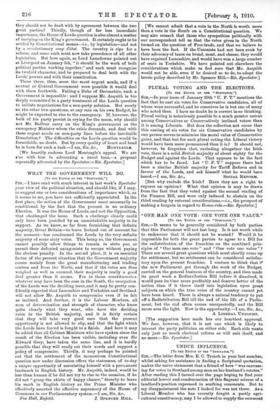WHAT THE GOVERNMENT WILL DO.
LT0 THE Enrroa or nice "SracreToit."] SIR, —I have read with much interest in last week's Spectator your view of the political situation, and should like, if I may, to suggest one or two considerations of importance which, as it seems to me, you have not sufficiently appreciated. In the first place, the action of the Government must necessarily be conditioned by the fact that the present is no ordinary Election. It was the House of Lords, and not the Opposition, that challenged the issue. Such a challenge clearly could only have been justified by an unmistakable majority in its support. As we know, so far from furnishing that definite majority, Great Britain—to leave Ireland out of account for the moment—has condemned the Lords by the very definite majority of some sixty votes. This being so, the Government cannot possibly allow things to remain in statu quo, or permit their defeated antagonists to escape without paying the obvious penalty. In the second place, it is an essential factor of the present situation that the Government majority comes mainly from the great manufacturing and trading centres and from the North, and that if the votes are thus weighed as well as counted, their majority is really a good deal greater than it seems. For in those constituencie s whatever may have been the case in the South, the usurpation of the Lords was the deciding issue, and it may be pretty con- fidently expected that Lancashire and Yorkshire and Scotland will not allow Mr. Asquith to compromise even if he felt so inclined. And further, it is the Labour Menbers, all men of determination and strength of character, who know quite clearly what they want, who have the deciding voice in the British majority, and it is fairly certain that they will take very good care that the present opportunity is not allowed to slip, and that the fight which the Lords have forced is fought to a finish. And here it may be added that all Cabinet Ministers who have spoken since the result of the Election has been visible, including even Sir Edward Grey, have taken the same line, and it is hardly possible that they will easily eat their words and support a policy of compromise. Thirdly, it may perhaps be pointed out that the settlement of the momentous Constitutional question now under discussion offers the statesman of to-day a unique opportunity of associating himself with a permanent landmark in English history. Mr. Asquith, indeed, would be less than human if he did not try to rise to the occasion, if he did not "grasp the skirts of happy chance," thereby to leave his mark in English history as the Prime Minister who effectively asserted the effective supremacy of the House of Commons in our Parliamentary system.—I am, Sir, eze.. [We cannot admit that a vote in the North is worth more than a vote in the South on a Constitutional question. We may also remark that those who sympathise politically with our correspondent tell us that the votes given in the North turned on the question of Free-trade, and that we believe to have been the fact. If the Unionists had not been sunk by their advocacy of taxes on bread, mast, and cheese, they would have regained Lancashire, and would have won a large number of seats in Yorkshire. We have pointed out elsewhere the considerations which make us feel sure that Mr. Asquith would not be able, even if he desired so to do, to adopt the heroic policy described by Mr. Spencer Hill—ED. Spectator.]










































 Previous page
Previous page